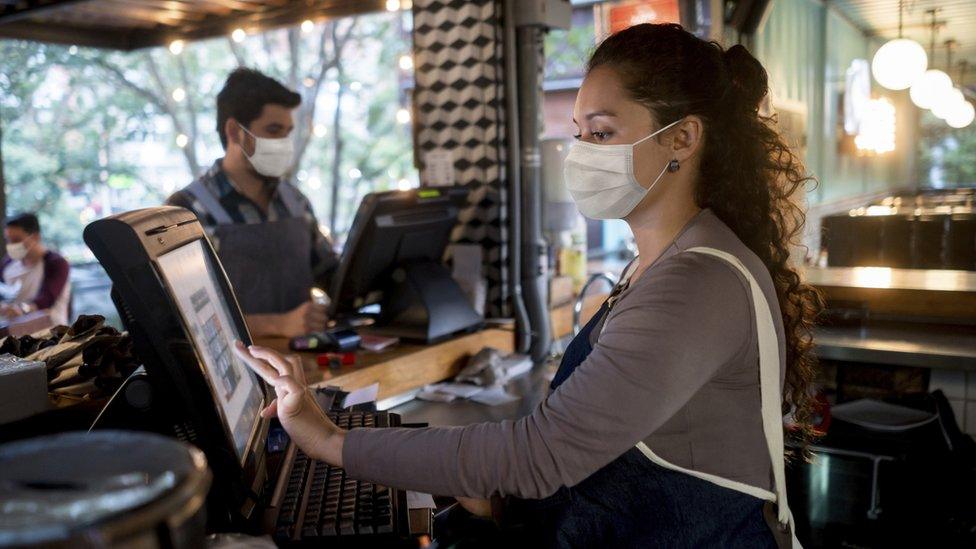Real Living Wage rises to £9.90 an hour
- Published
- comments

More than 300,000 people working for employers who have voluntarily signed up to the Real Living Wage are getting a pay boost of 40p to £9.90 an hour.
This is not to be confused with the compulsory National Living Wage, which is currently £8.91 an hour for anyone over the age of 23.
Real Living Wage employers in London will pay £11.05 an hour, a 20p rise.
Almost 9,000 employers throughout the country have signed up to the policy - 3,000 of them during the pandemic.
The latest employers to join include housebuilders Taylor Wimpey and Persimmon Homes, Fujitsu, food delivery company Getir and outsourcing firm Capita.
Companies already accredited include half of the FTSE 100 and big household names such as Everton Football Club, insurer Aviva, luxury goods brand Burberry and the Nationwide building society.
The recommended rate is intended to ensure all staff earn a wage that meets the real cost of living and covers everyday needs.
Greater security
Latest research by the Living Wage Foundation shows that there are still 4.8 million jobs - 17.1% of all employees - still paying less than the Real Living Wage in the UK.
Northern Ireland had the highest proportion of jobs paying below the Living Wage at 21.3%, while south-east England had the lowest at 12.8%.
Workers from ethnic minority groups are also more likely to be low-paid, with 19.4% of these workers earning below the Living Wage, compared with 16.3% of white workers.
The Living Wage Foundation's director, Katherine Chapman, said the new pay rates, which apply from Monday, would "provide hundreds of thousands of workers and their families with greater security and stability".
Speaking to the BBC's Today programme. she said: "It is still a pound, two pounds higher than the [national] minimum wage and that makes a huge difference. That means not having to worry about putting food on the table, or paying the bills at the end of the month.
"And we've seen record numbers of employers signing up this year because ultimately they want to do the right thing by their workers."
Gerald Mason, senior vice president at Tate and Lyle Sugars, told the BBC it had signed up to the Real Living Wage last year because "it was the right thing to do".
"The teams that benefited feel much more stable and secure because their pay is much more secure. Previously they'd have to move jobs for 20 or 30 pence and hour, now the turnover in those teams is right down," he said.
"Secondly, although it only affects 5% of our workforce, it has a disproportionate impact on the wellbeing of everybody, because [the workers who see a pay rise] are the people that feed them breakfast in the canteen, keep their workplaces clean, and keep them safe."
TUC general secretary Frances O'Grady said that the organisation's report showed that low pay was "endemic", with millions of workers in jobs that do not fully cover their bills.
"With Britain in the middle of a cost-of-living crunch, it's time for the government to act," she said.
"Ministers must start by increasing the minimum wage to £10 immediately, banning zero hours contracts and giving trade unions greater access to workplaces to negotiate improved pay and conditions."
At the Budget, Chancellor Rishi Sunak announced that the National Living Wage will increase next year by 6.6%, to £9.50 an hour. The Universal Credit taper rate will also be cut, allowing claimants to keep more of the payment.
Related topics
- Published25 October 2021

